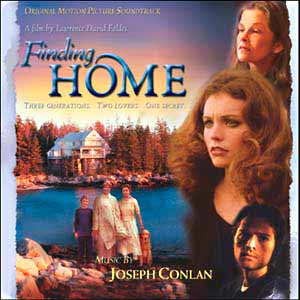Finding Home
Music composed, produced, programmed, and arranged by Joseph Conlan
Vocals by Lisbeth Scott, uilleann pipes and low D whistle by Eric Rigler
Performed by Unnamed Ensemble
Available on BSX Records (BSXCD 884)
Running Time: 79:15
Available for purchase from BSX Records.

See also:
Joseph Conlan's Website The Book of Stars Madison Both of the recent releases from BSX Records come from films I’ve never heard of before. This release and Madison both seem to occupy that awkward middle ground between theatrical screenings and Cable TV slots. And this is not all the two seem to have in common. While Madison feels like an unambitious entry in the small town sports genre, with a very pleasant score (by Kevin Kiner and Christopher Young) that nonetheless must be noted as derivative, Laurence David Foldes’ Finding Home (2003) feels like an unambitious entry in the city-girl-recovers-small-town-roots-through-inherited-property genre, with a very pleasant score (by Joseph Conlan) that must be noted as derivative. While in Madison the source of the derivation was somewhere between a small dose of John Williams Far and Away and a large dose of Jerry Goldsmith’s Rudy, here the most recognizable style is the more melodic Thomas Newman. Not that this score doesn’t have a definite identity to it, but the resemblance should be noted.
Attention to acoustic dynamics throughout the score is one of the things that brings Newman to mind. For a score whose budget was presumably not too large, there’s a surprising variety in the material. The many styles here include:
- the expansive sounding underscore driven largely by piano and strings (the second half of ‘One Telephone Call’);
- the emphasis on Celtic solo textures (the uillean pipes throughout the score – much like Road to Perdition);
- the frequently-referenced warm piano rendering of the lilting ‘Amanda’s Theme’ (first heard in ‘Finding Home’ and given an ethereal pop vocal by Helen Conlan in ‘End Credits’);
- the near hymnal Shawshank-like progressions of the theme in ‘Like it was yesterday’;
- for the hallucinatory scenes, the acoustic manipulation of the Lisbeth Scott vocals so that they are almost gasps for breath among dissonant acoustic and electronic textures (hinted at in ‘Shadows’ and heard more overtly in the middle of ‘Like it was yesterday’);
- the cooing choir set against guitar and strings is another nice touch (the epiphanic ‘Withdraw the Offer’);
And there is a lot more throughout the album’s luxurious seventy-nine minute running time.
Despite the variety though, the resonance of the themes, the lush diatonic and occasional chromatic harmonies throughout, it’s not an album I feel I’ll be returning to often. I can think of two reasons why. Partly it’s the length – too much of a good thing is no good thing, and in this respect this album shares a flaw often seen in the indulgent releases of lesser James Horner scores. I’m sure there’s someone out there who will want to hear all of this in one sitting and count it a blessing. I just have trouble believing that the majority of soundtrack collectors wouldn’t have preferred a more judiciously chosen forty to forty-five minute album. (I mean, think about it – three of the best scores of recent years, Desplat’s Birth, Sams’s Enduring Love, and James Newton-Howard’s The Village, were all half the length of this release, and hardly suffered for the economy!)
Secondly, there’s a structural problem here. The themes are as poignant, the orchestrations as thick, and dramatic peaks as high at the start of the score as they are at the finish. It’s hard to believe that this film couldn’t have benefited from a score structure more organic to the dramatic arc (presumably there is one). If the story is about a woman who approaches a sense of peace by confronting the emotional demons of her past, then perhaps the music should approach a sense of peace instead of starting from that point. It’s like the action music of the current scoring climate – Van Helsing and Cutthroat Island treat every action scene like it’s the greatest, most white-knuckled action scene ever filmed. Never mind it’s the first one in the film, and the composer has given himself no room to increase the intensity. (They’d be advised to study the dynamics of Christopher Gordon’s Ward 13 score – the full orchestral action is held off until strings-based action music has run its course, and the latter is brought back when the former tires, as it must.) So too with Finding Home, it feels like all moments are equally ‘dramatic’, regardless of their positioning in the narrative. And it’s a rare seventy-nine minute album that can sustain that mode in perpetuum.
And yet I concede this is a very pleasant listen indeed. It’s a bit like The Book of Stars, a recent La-La-Land release. It’s melodic, it’s lush, it’s incredibly professional sounding for a low budget film. The liner notes are great, the cover art is not so great, there’s more than enough attractive cues here to listen to. I don’t quite know what to give it, but for the sake of how nice it sounds, I will err on the positive.
[PS. I beg the film composers of the future to leave Celtic music aside for a while. There are many nations, many unique timbres, and having the uillean pipes both here and in Madison this month, I’ve just about had my fill of it.]
Michael McLennan
As the Complete Album:
2.5
When 7-8 tracks out of the 29 are judiciously chosen for an edited experience:3.5
Return to Reviews Index